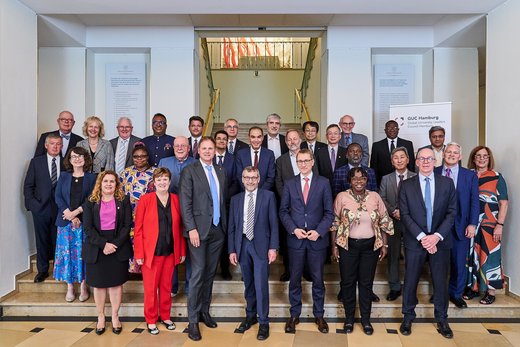At the fifth Global University Leaders Council (GUC) Hamburg, university leaders from around the world adopt recommendations in relation to competition and collaboration in the Hamburg Declaration. Both principles fundamentally shape the relationships between universities as well as the research and teaching mission.
Global challenges such as the pandemic and the climate crisis have led to new forms of collaboration in research and teaching worldwide. At the same time, competition has become more intense and complex, with universities around the world competing for talent, funds and prestige. Currently, the changed geopolitical situation, the threat to academic freedom and increasing scepticism about science in many countries of the world pose a particular challenge to universities.
The deliberations at this year's GUC meeting in Hamburg therefore focused on the demand that universities find a balance between competition and collaboration based on their institutional values. Only in this way can they make a lasting contribution to science and society in the 21st century.
"Universities must not allow themselves to be pushed by external expectations. They themselves determine the way they compete and work together. University leaders have a central role to play here. To protect their values and standards, they must anticipate social and political developments and act accordingly," says the President of the German Rectors' Conference, Prof Dr Walter Rosenthal. "This requires universities to develop a common voice nationally and globally and to ensure that it is heard across all sectors of society."
Universities should, GUC participants concluded, enter into strategic institutional partnerships based on long-term commitment and trust. Such collaboration makes sense not only between institutions of a similar size and mission, but also between structurally complementary institutions and with non-university actors in society.
"To make international university cooperation resilient, sustainable and fair in a multipolar world, we need to make more effort to diversify partnerships and build multilateral networks. In particular, collaboration on an equitable footing between the Global North and the Global South is the key to overcoming global challenges," explains Prof Dr Hauke Heekeren, President of Universität Hamburg. "As one of our international strategy conferences, the GUC is closely linked to our excellence concept for a sustainable future," says Heekeren.
"In view of the many crises and conflicts in the world at present, which are also affecting science, it is an important signal when university leaders from six continents formulate common values for the higher education system transcending all differences," says Dr Thomas Paulsen, Member of the Executive Board of Körber-Stiftung. "It is therefore an important demand of the GUC that universities show solidarity with their partner institutions around the world when they are confronted with restrictions on academic freedom," Paulsen emphasises.
The Global University Leaders Council (GUC) Hamburg brings together university presidents from around the world in Hamburg to discuss global challenges facing the higher education system. The central concern of the meeting, which takes place every two years, is to consciously shape global university development and to jointly identify possible solutions. This year, 30 university leaders from 21 countries on six continents participated in the fifth GUC since 2015. The Council is a joint initiative of the German Rectors’ Conference, Körber-Stiftung and Universität Hamburg.
Materials:
• Hamburg Declaration "Navigating competition and collaboration – The way forward for universities" (PDF, 3 pages)
• Study "Navigating competition and collaboration – The way forward for universities" (PDF, 70 pages)
Further Information: www.guc-hamburg.de
Press Release
Shaping the future globally: universities seek a balance between competition and collaboration
16. June 2023

